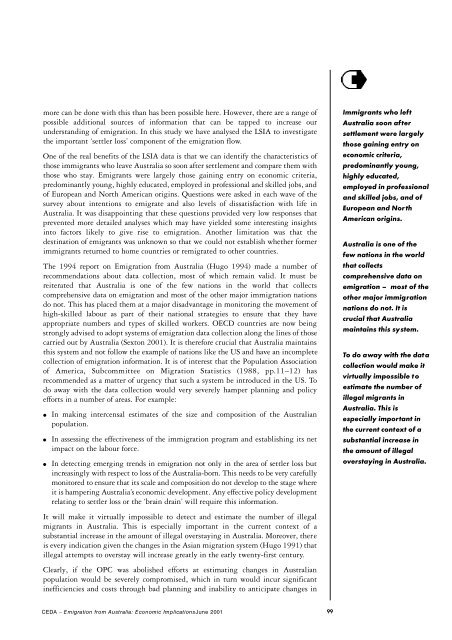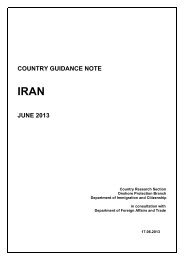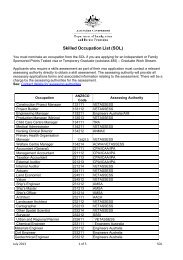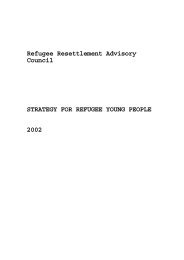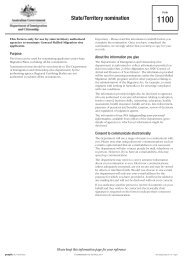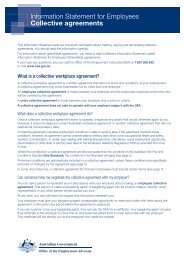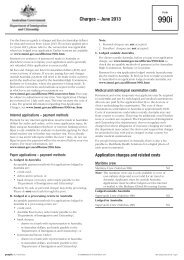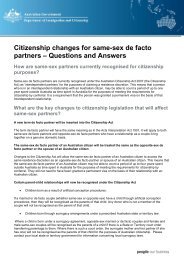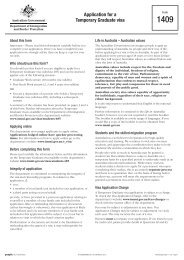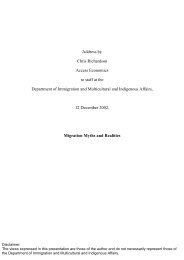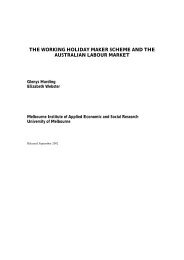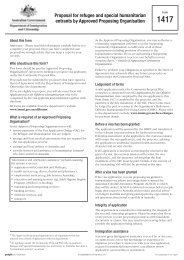part three - Department of Immigration & Citizenship
part three - Department of Immigration & Citizenship
part three - Department of Immigration & Citizenship
Create successful ePaper yourself
Turn your PDF publications into a flip-book with our unique Google optimized e-Paper software.
more can be done with this than has been possible here. However, there are a range <strong>of</strong><br />
possible additional sources <strong>of</strong> information that can be tapped to increase our<br />
understanding <strong>of</strong> emigration. In this study we have analysed the LSIA to investigate<br />
the important ‘settler loss’ component <strong>of</strong> the emigration flow.<br />
One <strong>of</strong> the real benefits <strong>of</strong> the LSIA data is that we can identify the characteristics <strong>of</strong><br />
those immigrants who leave Australia so soon after settlement and compare them with<br />
those who stay. Emigrants were largely those gaining entry on economic criteria,<br />
predominantly young, highly educated, employed in pr<strong>of</strong>essional and skilled jobs, and<br />
<strong>of</strong> European and North American origins. Questions were asked in each wave <strong>of</strong> the<br />
survey about intentions to emigrate and also levels <strong>of</strong> dissatisfaction with life in<br />
Australia. It was disappointing that these questions provided very low responses that<br />
prevented more detailed analyses which may have yielded some interesting insights<br />
into factors likely to give rise to emigration. Another limitation was that the<br />
destination <strong>of</strong> emigrants was unknown so that we could not establish whether former<br />
immigrants returned to home countries or remigrated to other countries.<br />
The 1994 report on Emigration from Australia (Hugo 1994) made a number <strong>of</strong><br />
recommendations about data collection, most <strong>of</strong> which remain valid. It must be<br />
reiterated that Australia is one <strong>of</strong> the few nations in the world that collects<br />
comprehensive data on emigration and most <strong>of</strong> the other major immigration nations<br />
do not. This has placed them at a major disadvantage in monitoring the movement <strong>of</strong><br />
high-skilled labour as <strong>part</strong> <strong>of</strong> their national strategies to ensure that they have<br />
appropriate numbers and types <strong>of</strong> skilled workers. OECD countries are now being<br />
strongly advised to adopt systems <strong>of</strong> emigration data collection along the lines <strong>of</strong> those<br />
carried out by Australia (Sexton 2001). It is therefore crucial that Australia maintains<br />
this system and not follow the example <strong>of</strong> nations like the US and have an incomplete<br />
collection <strong>of</strong> emigration information. It is <strong>of</strong> interest that the Population Association<br />
<strong>of</strong> America, Subcommittee on Migration Statistics (1988, pp.11–12) has<br />
recommended as a matter <strong>of</strong> urgency that such a system be introduced in the US. To<br />
do away with the data collection would very severely hamper planning and policy<br />
efforts in a number <strong>of</strong> areas. For example:<br />
●<br />
●<br />
●<br />
In making intercensal estimates <strong>of</strong> the size and composition <strong>of</strong> the Australian<br />
population.<br />
In assessing the effectiveness <strong>of</strong> the immigration program and establishing its net<br />
impact on the labour force.<br />
In detecting emerging trends in emigration not only in the area <strong>of</strong> settler loss but<br />
i n c reasingly with respect to loss <strong>of</strong> the Australia-born. This needs to be very care f u l l y<br />
m o n i t o red to ensure that its scale and composition do not develop to the stage where<br />
it is hampering Australia’s economic development. Any effective policy development<br />
relating to settler loss or the ‘brain drain’ will re q u i re this inform a t i o n .<br />
Immigrants who left<br />
Australia soon after<br />
settlement were largely<br />
those gaining entry on<br />
economic criteria,<br />
predominantly young,<br />
highly educated,<br />
employed in pr<strong>of</strong>essional<br />
and skilled jobs, and <strong>of</strong><br />
European and North<br />
American origins.<br />
Australia is one <strong>of</strong> the<br />
few nations in the world<br />
that collects<br />
comprehensive data on<br />
emigration – most <strong>of</strong> the<br />
other major immigration<br />
nations do not. It is<br />
crucial that Australia<br />
maintains this system.<br />
To do away with the data<br />
collection would make it<br />
virtually impossible to<br />
estimate the number <strong>of</strong><br />
illegal migrants in<br />
Australia. This is<br />
especially important in<br />
the current context <strong>of</strong> a<br />
substantial increase in<br />
the amount <strong>of</strong> illegal<br />
overstaying in Australia.<br />
It will make it virtually impossible to detect and estimate the number <strong>of</strong> illegal<br />
migrants in Australia. This is especially important in the current context <strong>of</strong> a<br />
substantial increase in the amount <strong>of</strong> illegal overstaying in Australia. Moreover, there<br />
is every indication given the changes in the Asian migration system (Hugo 1991) that<br />
illegal attempts to overstay will increase greatly in the early twenty-first century.<br />
Clearly, if the OPC was abolished efforts at estimating changes in Australian<br />
population would be severely compromised, which in turn would incur significant<br />
inefficiencies and costs through bad planning and inability to anticipate changes in<br />
C E DA – Emigration from Australia: Economic ImplicationsJune 2001<br />
99


